If you’re a meeting facilitator with attendees from different departments, teams, and levels of authority, and you’re tired of being interrupted, ignored, or talked over, this is for you.
How to Gain Instant Respect and Be Taken Seriously by Meeting Attendees You Don’t Have Authority Over
Backed by decades of hands-on experience, this proven framework guarantees:
- You’ll confidently lead your next meeting with clear, compelling communication that commands attention and earns respect – even without a formal title.
- You’ll gain the ability to navigate high-pressure, complex meetings with ease, earning genuine trust and authority from every attendee.
- You’ll experience immediate improvements in meeting outcomes by using ready-made templates, scripts, and tools designed to simplify your preparation and execution.
- You’ll effortlessly maintain control and clarity throughout your meetings, freeing yourself from stress, frustration, and burnout while maximizing your influence.
But let’s be honest—your meetings don’t look like that yet.
You want to make meetings matter.
But you lack control over your participants’ behavior.
Without positional power, it’s hard to manage dominant voices, encourage real participation, or address disruptive behaviour head-on.
Your attendees show up—but they’re disengaged.
They offer suggestions but don’t follow through.
You want to speak with more authority, but when someone senior cuts in, you fall silent.
Your proposals don’t gain buy-in.
You hold the microphone, but not the room. It’s like having the title without the voice—and it’s belittling.
Worse, when nothing gets done… you’re the one held accountable.
You carry the stress when discussions stall,
when decisions are delayed,
when deadlines slip.
And the cycle repeats.
Engagement drops. Trust fades. Morale sinks.
Opportunities are wasted—and you feel stuck, unheard, and alone.
If any of that feels familiar… you’re not alone.
I know exactly how it feels to want to lead with confidence—but feel invisible instead.
I’ve been in rooms where my ideas fell flat, where I tried to hold the space but didn’t feel heard.
That’s why this isn’t just theory for me—it’s personal.
I’m Ms. Gran, a Regulatory Compliance Specialist.
And I remember it clearly…
My manager told me I’d be facilitating a meeting—just days away.
Panic hit me fast.
My mind raced with nervous overthinking.
I didn’t know where to start.
I was overwhelmed by everything I was told I should be doing…
…And stressed by my colleagues’ high expectations.
Worse, I had to facilitate a group of people in managerial positions—people I barely knew.
I entered the conference room…
Insecurity took over.
I started highlighting my weaknesses, apologizing too much, doubting myself.
And unsurprisingly, I left that meeting feeling frustrated and defeated.
Those days were hard.
It felt like going into battle—already knowing you’ve lost.
No one took my meetings seriously.
People forgot the schedule unless I reminded them, sometimes an hour before.
Some double-booked. Others came late. Some didn’t come at all.
I got brushed off.
I was the facilitator, but I was silenced by dominant participants.
They were on their phones, chatting, barely paying attention.
And when the meeting drifted off course, it was hard to pull it back.
Worse were the sarcastic jokes:
“Are we done yet? Are we done?”
It was insulting.
One time, they rescheduled the meeting just because I was facilitating—not my boss—
…Even though the decision-makers were already in the room.
It was clear: they were only attending because of compliance—not because they valued the meeting.
They weren’t engaged.
My meetings weren’t productive.
And as a Regulatory Compliance Associate (at that time), that’s not acceptable.
Our job is to ensure the company complies with regulatory orders—
To avoid penalties and maintain a clean record for franchise renewal.
And yet, I had no control over my participants’ behavior.
I couldn’t just blame them for not providing data. That excuse doesn’t fly.
I started to question myself:
“Is this the kind of work I’ll do for the rest of my life?”
“Will it always be this stressful?”
“Maybe it’s just me. Maybe I’m not assertive enough.”
Then came a turning point.
After one meeting, during feedback, my boss said:
“You keep making strange sounds when you talk. Like ‘heiheihei… heihei…’”
She even imitated me.
It was awkward. Embarrassing. In front of my colleagues.
“Stop that! They won’t take you seriously if you do that.”
I paid attention—and yes, I did that a lot, especially when assigning tasks.
It’s called nervous laughter.
I was hesitant to make demands.
Afraid of being rejected.
Afraid of not getting buy-in.
That feedback was like a punch to the gut.
It was painful.
But it was honest.
They didn’t believe me—because I didn’t believe myself.
I wasn’t respected because I hadn’t learned how to facilitate efficiently.
If my manager had been the one leading, they would have responded differently.
So I started observing how she ran her meetings.
How my colleagues facilitated theirs.
And I realized:
To Have Control Over My Meetings, I Needed to Be Respected.
Not with formal authority—
But with earned authority.
The kind that comes from influence, structure, and clarity.
I decided to learn from my manager.
She’s kind, but she doesn’t sugarcoat things.
Her feedback hits hard—unexpected, unscripted, and painfully honest.
Not the kind I was used to (think gentle parenting), but exactly the kind I needed.
I watched how she dealt with participants—from senior managers to entry-level staff.
I took notes.
I learned from my colleagues’ meetings—what worked and what didn’t.
I implemented attendees’ unsolicited feedback and suggestions.
I studied resources covering leadership, execution, corporate culture, project management—even personal development.
I watched videos, scoured forums, and followed Q&A threads on how to run better meetings.
I created a learning → application → feedback → refinement loop.
It was a loooong process.
And eventually…
Things Changed.
When I stopped blaming my participants
—and took responsibility for how I facilitated—
everything began to shift.
People showed up on time.
They paid attention.
They participated.
My meetings had direction, decisions, and outcomes.
And I finally felt what it was like to lead with confidence—even without formal authority.
That’s why I started paying close attention—not just to what makes meetings run, but what makes people listen.
I studied what earns trust, respect, and follow-through—especially when you don’t have a formal title.
I compiled everything I’ve learned—the exact steps, words, and strategies that helped me shift from being overlooked to being listened to—into something that can change how you lead forever.
It’s not about having power. It’s about earning it.
And that’s what I call Earned Authority.
I realized something powerful:
Authority isn’t something you’re given—it’s something you earn.
And once I understood that, everything changed.
I stopped waiting for permission.
I stopped trying to imitate people with titles or force control I didn’t have.
Instead, I focused on what actually earns trust, attention, and cooperation in a room:
✅ The way you prepare.
✅ The way you show up.
✅ The way you structure a discussion.
✅ The way you guide people—not just speak to them.
That’s what earns authority.
Not status. Not volume.
But clarity, presence, and consistency.
And that realization became the foundation for a repeatable system—
one that’s helped not just me, but many facilitators lead meetings that work… even without formal power.
It’s the step-by-step framework that shows you exactly how to lead meetings with influence, presence, and results—
no matter your role, title, or personality.
I’ve distilled everything into three powerful keys…
- Key 1: Clarity — You must know exactly what to say, how to say it, and when to stay silent. The right words, delivered with confidence, help you earn trust and command attention.
- Key 2: Structure — You must have a clear, well-thought-out plan. When your meetings follow a solid structure—complete with agendas, flow, and follow-up—people stay engaged and action happens.
- Key 3: Influence — You must learn how to lead through influence, not authority. That’s how you shift the room, handle pushback, and move conversations forward—even without a formal title.
Will this work?
This framework is the result of over 20 years of combined experience—drawn from countless meetings involving myself, my mentors, and colleagues. It comes from high-stakes environments like Regulatory Compliance, where outcomes must be delivered without delay—driven by the pressure of possible show-cause orders, penalties, or administrative liabilities. These weren’t just ‘nice-to-have’ projects; they demanded results.
It includes everything we’ve learned from meetings that succeeded—and those that didn’t. Whether in-person, online, or hybrid, the tools and platforms may change, but people don’t. At the core, we all want to feel valued, take ownership, contribute meaningfully, and find purpose in our work.
Will this work for you? I guarantee it will.
I’ve always disliked books that explain what and why but don’t clearly show how—the step-by-step path from A to B. What often traps people is the lack of clarity on exactly what to do.
For example, when two attendees are in conflict, you have to mediate to keep the discussion productive.
Here’s how you can do it effectively:
- Seat the participants so they’re not directly facing or sitting next to each other.
- Give each person dedicated time to express their viewpoint without interruption.
- Acknowledge their concerns and validate their feelings.
- Refocus the conversation by reminding everyone that you’re all working toward a shared goal.
- Reinforce the meeting rules to ensure respectful communication.
- Invite both parties—and others—to share their opinions to demonstrate impartiality.
- If needed, suggest a short break to ease tensions before continuing.
With clear, actionable steps, you’ll always know exactly what to do next.
I call it the Earned Authority Framework
Will this work for your team?
I understand that every team is unique, with its own dynamics, challenges, and personalities. That’s exactly why this framework is designed to be practical and adaptable. It’s not a one-size-fits-all script—it’s grounded in over 20 years of real-world experience with diverse teams and meeting goals.
The core principles here are universal, and the strategies are designed to help you navigate different personalities, conflicts, and priorities effectively.
If you commit to applying the steps thoughtfully and tailoring them to your team’s specific context, you’ll see positive changes in how your meetings run—and how your team collaborates.
What The Earned Authority Framework Won’t Do
- It’s not a magic trick—it takes practice. Unlike gimmicks or quick hacks, this framework builds real, lasting confidence. What you develop stays with you—meeting after meeting.
- It won’t give you formal authority. It teaches you to earn respect through presence, clarity, and trust—not power or position.
- You’ll need to look at your own habits. It’s not about fixing “difficult people”—it’s about refining how you show up. Self-awareness is the superpower of great facilitators.
- It’s designed for the messy, real world. This isn’t idealistic theory. It’s built from lived experience leading meetings across teams, departments, and power dynamics—just like yours.
- It’s simple, but not always easy. Every strategy in the framework is actionable and tested, but you’ll still grow through doing.
The Earned Authority Framework
Here’s what you’ll gain from the framework:
The Earned Authority Framework Guidebook – $49.00
Here’s a glimpse of what is inside:
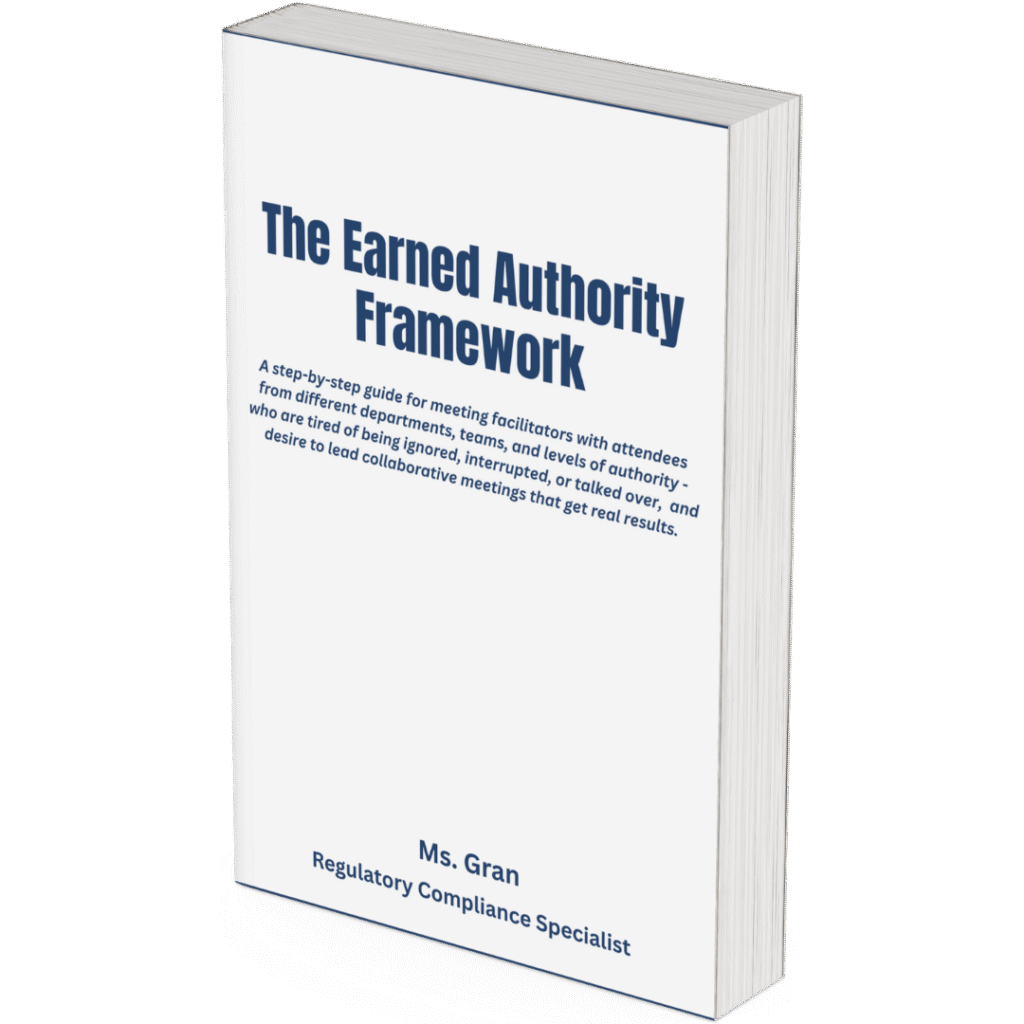

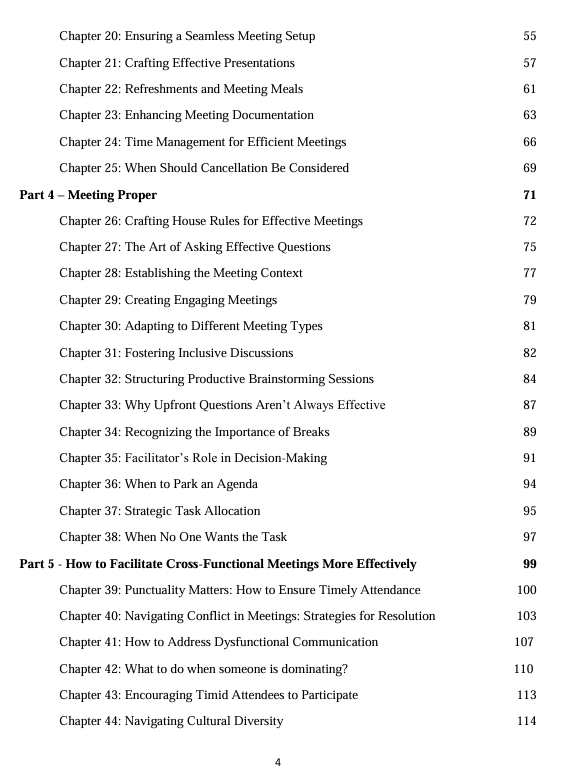

What you will learn from here:
- Gain clarity on your unique influence as a facilitator (Ch. 4–6). Learn how to build trust, earn respect, and establish your presence—regardless of your role or rank.
- From designing the agenda (Ch. 9) to managing schedules, attendees, and logistics (Ch. 10–22), you’ll have a step-by-step roadmap to take control of the flow—without feeling overwhelmed.
- Discover how to ask better questions (Ch. 24), create inclusive conversations (Ch. 28), and handle dominant or disengaged participants (Ch. 39–40) with calm and clarity.
- Learn proven techniques to defuse tension, address poor behavior (Ch. 37–38), and promote healthy group dynamics, even in cross-functional settings (Ch. 42–43).
Bonus 1: Ready-to-Use Meeting Toolkit - $49.00
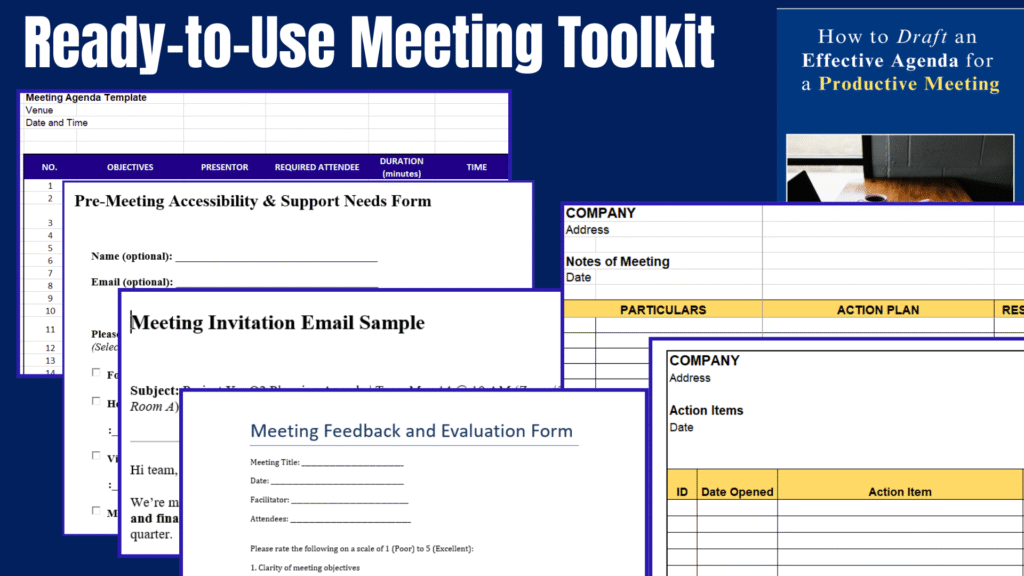
- Meeting Agenda Template – $10
- Pre-Meeting Accessibility & Support Needs Form – $8
- Meeting Agenda Email Template – $7
- Notes of Meeting Template – $8
- Action Item Tracker Template – $9
- Meeting Feedback and Evaluation Form – $7
Bonus 2: The Confidence Kit for Facilitators - $67.00
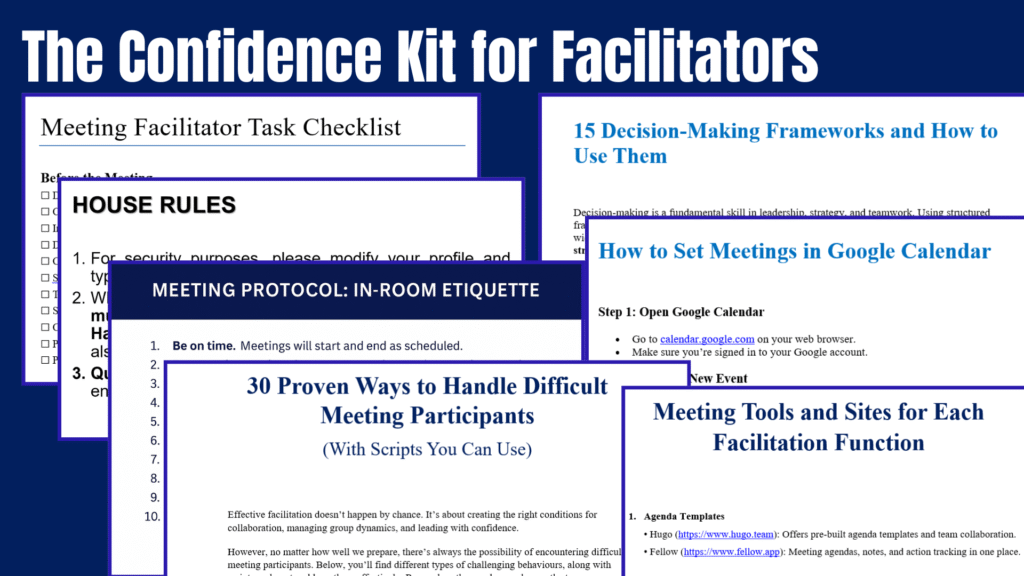
- Meeting Facilitator Task Checklist – $7
- Online House Rules (PowerPoint) – $6
- Face-to-Face Meeting Rules (PowerPoint) – $6
- 30 Proven Ways to Handle Difficult Meeting Participants
- 15 Decision-Making Frameworks and How to Use Them – $12
- How to Set Meetings in Google Calendar – $5
- Meeting Tools and Sites for Each Facilitation Function – $16
Bonus 3: The Ice Breaker Vault - $27.00
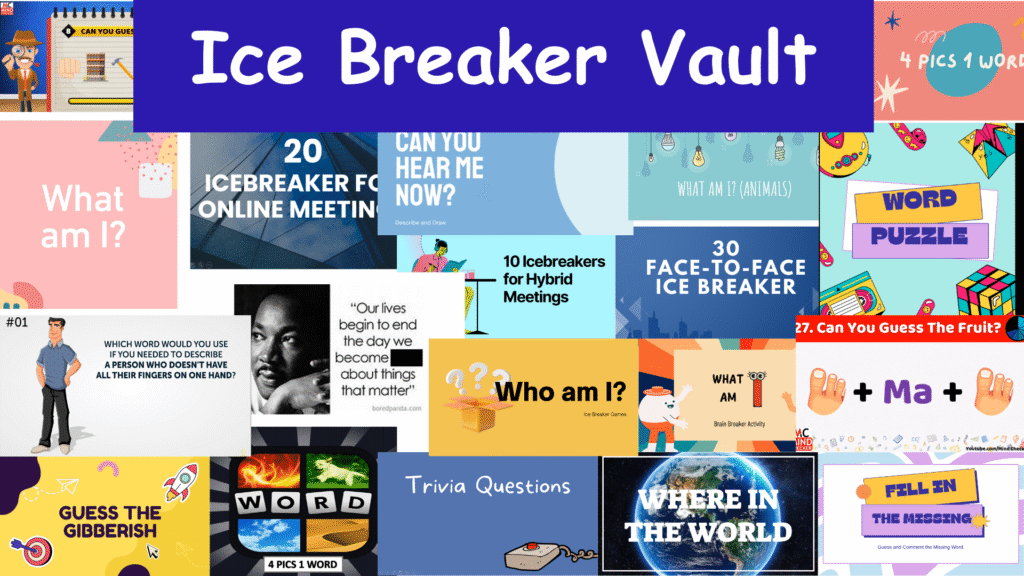
- 30 Face-to-Face Icebreakers (with Instructions) – $7
- 20 Icebreakers for Online Meetings (with Instructions) – $6
- 10 Icebreakers for Hybrid Meetings (with Instructions) – $5
- 18 Ready-to-Use Icebreakers for Online Meetings in PowerPoint – $9
What you will get from here:
- With done-for-you agendas, emails, notes, trackers, and checklists, you can focus on leading—not building documents from scratch.
- Use professional tools that help you set expectations, manage behavior, and guide conversations with structure and ease.
- Instantly energize your sessions with proven icebreakers designed for face-to-face, virtual, and hybrid formats.
- Don’t get caught off guard—use ready-made scripts and strategies to address dominant, disengaged, or disruptive attendees professionally.
- Make sure everyone feels seen and supported—and that no action item falls through the cracks.
Now you might be wondering—how much will it cost?
But before I tell you, let me ask you this:
What’s the true cost of ineffective meetings?
There’s the financial cost—salaries, venues, transport, logistics, meals.
Then there’s the cost of time—time away from deep work, delayed decisions, missed opportunities.
And don’t forget the intangible costs—low morale, disengaged teams, unspoken frustrations, unfulfilled potential.
I’ve paid my share:
Through long hours, sweat, setbacks, harsh feedback, self-doubt, and countless trial-and-error meetings.
And I poured all of that hard-won experience into this framework—so you don’t have to.
Because meetings do matter. They affect your team, your company, your customers—and even the families of both you and your attendees.
My mission is simple:
To help facilitators like you transform meetings—one meaningful discussion at a time.
Could I give this away for free?
Maybe.
But I’ve learned people rarely commit to what they get without effort.
So instead, I priced it accessibly—just $49 for everything.
Not $192, but $49 for everything.
This exclusive offer is limited to the next 100 facilitators. It’s our way of rewarding those who are motivated, determined, and ready to transform their meetings—because the best results come to those who take action. After that, the price will return to its original individual rates.

I’m confident this framework will help you lead meetings with more clarity, confidence, and control. That’s why I’m offering a no-questions-asked refund if it doesn’t deliver on its promises.
If, after studying and applying it, you still:
- Find it difficult to prepare clear, purposeful meeting agendas
- Can’t seem to save time using the included tools and templates
- Feel overwhelmed during preparation instead of streamlined and confident
- Have trouble managing difficult or disruptive participants
- Fail to guide discussions toward meaningful outcomes
…then simply reach out, and you’ll receive a full refund. No hassle. No questions.
Because honestly, it feels wrong to gain from something that didn’t prove valuable to you.
I’d rather you get your money back than feel disappointed with your purchase.
If you know this is something you want to work on, don’t wait too long. The sooner you apply it, the sooner your meetings can change—and you avoid another month of wasted time and energy.
Grab your step-by-step framework for earning authority and taking control of your next meetings.
Warning—it only works if you do.
Execution is what makes the difference.
You either take charge now and start leading meetings that get results—or keep feeling ignored, powerless, and stuck watching opportunities slip away right in front of you.